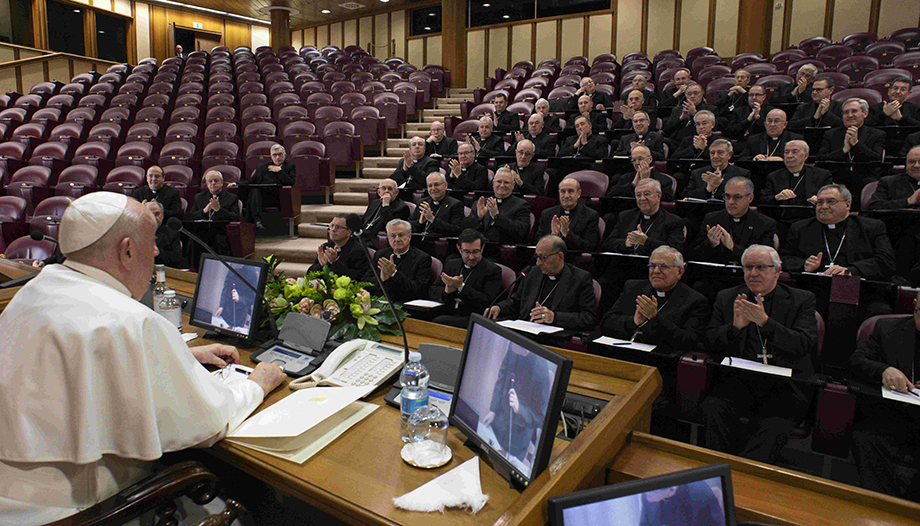Expectation. This was the general tone before the convocation of Pope Francis to the Spanish bishops to discuss the outcome of the apostolic visit to the Spanish seminaries the Uruguayan bishops: Bishop Arturo Eduardo Fajardo, Bishop of Salto, and Bishop Milton Luis Tróccoli, Bishop of Maldonado-Punta del Este - Minas, made to all the seminaries of Spain during the months of January to March 2023.
Despite this expectation and some "fears of a reprimand", dialogue and encouragement seem to have been the keynote of this day. This was corroborated by the President of the EEC, Cardinal Juan José Omella; the Secretary General, Bishop Francisco César García Magán, and the President of the Episcopal Subcommission for Seminaries, Bishop Jesús Vidal, who were in charge of speaking to journalists after the day.
2 hours of dialogue with the Pope
The day began very early in the morning, at 8:00 a.m., with a meditation led by Cardinal Cantalamessa, preacher of the Pontifical Household, who gave a meditation based on the event of Pentecost, on the need and importance of a personal encounter with Jesus Christ for priests and seminarians. It was during this prayer that Pope Francis joined the meeting. After the prayer, the Spanish bishops held a two-hour dialogue with the Holy Father in which they discussed "formation in seminaries, the pastoral experience of seminarians, and the importance of the various dimensions of formation".
The President of the Episcopal Conference, Juan José Omella, has emphasized that this meeting is for him a sign that "the synodal Church is taking steps". A synodality that is palpable in the Pope's dialogue with the bishops on a topic of such importance as the formation of priests.
Cardinal Omella summarized the day when he said that the synthesis of the meetings held with the Holy Father and the members of the Dicastery for the Clergy were aimed at preparing bishops, priests and seminaries "for the change of era" and to do so "now".
Along these lines, Bishop Jesús Vidal also expressed himself. Jesús Vidal, who underlined the Pope's encouragement to the Spanish bishops "to continue working on the implementation of the Ratio Fundamentalis formation plan".
Spain is the first country to have developed a formation plan for seminaries, a Ratio nationalis, and the bishops consider that perhaps this convocation is a new way of working that we will see, in a more normal way, from now on.
Bishop Vidal will oversee the development of the recommendations.
One of the novelties of this meeting was the designation of Bishop Jesús Vidalas as the bishop in charge of the discernment process and the promotion of formation in the seminaries.
Vidal will therefore be in charge of supervising the development in Spain of the recommendations contained in the conclusions of the working document prepared by the bishops who carried out this apostolic visitation.
These recommendations will be worked on by the other bishops and will certainly be put on the agenda of the permanent and plenary assemblies of the Spanish Episcopal Conference.
To form priests "who generate communion".
The Pope has been especially interested in the care of formation, with all its aspects, of candidates to the priesthood. In this area, Msgr. Vidal emphasized that "the Pope is very interested in human formation and, during the dialogue, he linked it to the communitarian dimension. The Pope insisted that priests should be capable of generating communion".
In this line, the auxiliary bishop of Madrid stressed that the Pope has asked bishops and priests to form priests "rooted in reality and at the service of the Gospel".
The three representatives of the Spanish Episcopal Conference have focused on the positive tone of a meeting that, because of its exceptionality, seemed to give more cause for concern than they have conveyed in the press conference. Responding to questions from journalists, both García Magán, Vidal and Omella stressed that the issue of sexual abuse of minors committed within the Church has not been dealt with "specifically", although, evidently, it has been dealt with in a tangential way when speaking of the human formation of candidates to the priesthood, which also includes affective-sexual formation.
Seminars with "sufficient training community".
Will seminaries or houses of formation be closed? This was one of the questions that hung in the air since the apostolic visit to the Spanish seminaries. On this point, although they did not speak of numbers, the Spanish bishops emphasized that, in their dialogue with the members of the Dicastery of the Clergy, the need for formation houses to always have "a sufficient formative community" emerged and they encouraged the Spanish prelates to "continue on the path" already begun in this area. Namely, the unification of some seminaries into interdiocesan formation houses. The reception and formation of migrant seminarians from other countries was another of the points raised during the day's work.
There are 86 seminaries in Spain, distributed in different formation houses. Catalonia has one interdiocesan seminary, 14 seminaries that receive seminarians from other dioceses in their formation houses, and 40 seminaries that receive their own seminarians. Of these 40, 29 are diocesan seminaries and 15 are Redemptoris Mater seminaries. There is also a formation community of a diocesan ecclesial reality.








